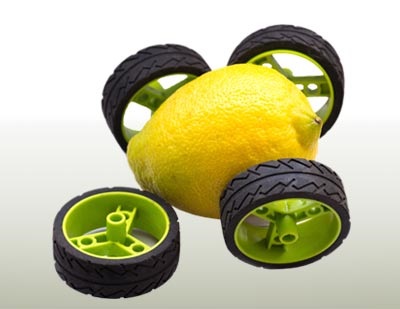So You Bought A Lemon: Lemon Law In Plain Language

Lemon:
1. A car, boat, motorcycle, toaster, crockpot, puppy, etc. that is defective.
2. A citrus fruit.
It is unclear when the word "lemon" began to refer to something defective, but if you've bought a lemon recently, you need to know the law and how it can help you. Lemon law varies a bit by state, but here are some general things you should know.
What is a lemon?
If you've bought a product that has to be repaired four or more times for the same defect within the warranty period and it still doesn't work, it's a lemon. The defect has to be something that prevents you from using the product or makes it unsafe to use, and the product has to be under warranty.
Lemon law most often applies to automobiles, so let's use a car as an example. If you buy a car and the paint starts chipping, it's not considered a lemon. If it makes weird noises or has a smell, it's still not a lemon. But if the engine falls out, the convertible top opens and closes by itself, or the windshield wipers move at 100mph, you might have a lemon.
Some states won't protect you under the lemon law if your car has a dozen different defects under the same warranty. Others will protect you even if your car has just one defect that threatens your safety. Electrical appliances are also covered under lemon law. Some states also have a "puppy lemon law," which protects people who unknowingly buy an unhealthy dog.
What cars are covered?
This depends on where the car was purchased. New cars are always covered under lemon law. In some states, used and leased cars are covered. Other states have separate laws for used cars. In some states, you will be referred to a lemon law attorney for clarification about how the lemon law applies to your leased car because it is so poorly worded that it is too confusing for even the Attorney General to explain!
What should I do to protect myself?
Document any and all repairs on your car. Keeping a record of repairs protects you under Consumer Laws. This includes but is not limited to: getting an invoice when you pick up your car from the mechanic (despite the fact that you shouldn't be charged under a warranty), noting dates and times of repair, keeping a record of who you talked to and how they helped you, and obtaining a copy of Warranty Repair Orders. It is up to you to keep track of repairs to protect yourself under lemon law.
When you take your car in for repairs, describe your complaint carefully, and describe it exactly the same way each time your car is repaired for a recurring problem. Keep track of how long your car is in the shop; most states cover car owners if their car has been in the shop for a certain number of accumulative days during the warranty coverage period. Also record any emotional stress your lemon puts you through, like breaking down in the middle of nowhere and causing you to wait 3 hours for assistance. This can really help your case.
Will I need a lawyer?
This depends on the state. In some states, you can simply file a complaint; in others, you will need a lawyer. About half of the states allow you to recover attorney fees (in some states this depends on if you win). If you lose, some states will require you to pay the manufacturer's attorney fees. Keeping a detailed account of your lemon's defects will give you the best chance of winning your case. Knowing the law helps you protect yourself. Go to your state's website to familiarize yourself with its lemon laws.
